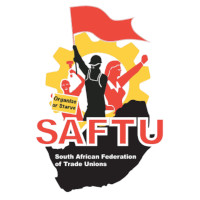The Cry of the Xcluded, comprising several social movements and trade unions, will once again protest on Budget Day, 22 February 2023. This we have done consistently since 2020, despite Covid 19 restrictions. We do so because the anti-poor budgets are destroying the working class and poor communities. These budgets, the National Budget and the Medium Term Budget Policy Statement destroy jobs by destroying South Africa’s productive economy. Mass unemployment, where almost 13 million people are denied work and a decent livelihood, is the foundation on which an unequal South Africa is built.
Budget cuts to health, education, welfare, police and all the services that poor people depend on, have created a wasteland. Our country is not just collapsing, it is hurtling towards the cliff face. The July 2021riots were not the wake-up call for our ‘Alice in Wonderland’ government. Such eruptions of anger are isolated incidents, for now in hundreds of communities around the country but will explode again as the situation further worsens. The cost of living crisis, load shedding and the increase in electricity of nearly20% makes this almost inevitable.
The attacks on public sector workers is an attack on the provision of public services and an attack on their unemployed family members. Women are compromised and made vulnerable to violence and exclusion. They must fill the gap of the retreating state, providing more care to their families and the broader society. They become the doctors, nurses, teachers, social workers, cooks and cleaners – the ones who must pick up the pieces as our communities collapse.
We have had enough. We are calling on our people to rise up. Our uprising is not to loot and destroy. Our call is for the people of our country to unite in solidarity and care. We are not rising up to attack other vulnerable groups. We are not attacking members of the LGBTQI+ community, foreign nationals, or people of different languages and skin colour. We are rising up as poor and working people regardless of colour, language, religion and gender. As the Cry of the Xcluded we recognise all of us are struggling to live, to have a home, to afford transport, electricity and to put bread on the table.
This February, when President Cyril Ramaphosa delivers his useless State of the Nation Address and when the Minister of Finance, Enoch Godongwana announces another budget which steals from the poor to give to the rich, we will be protesting. We will be making clear to the government that they have lost touch with the people. The entire month of February will be a month of mass education and action. We will hold speak-outs, teach-ins, protests and demonstrations. We want to create awareness, we want to channel the anger of our people to where it belongs. And this is not a once-off process. For the rest of2023 leading to 2024, we will be organising and mobilising for the Year of Mass Action campaign.Here are some of our demands:
An end to budget cuts that hurt the Xcluded: Cutting the budget in a time of economic stagnation will destroy the very tools and resources we need to jump-start the economy. This requires a huge mobilization of state resources that will pump life back into our economy.We call on the government to “fix Eskom”: We reject and condemn all those who wish to privatise Eskom and who welcome its death spiral. We demand a new transparent and accountable Eskom, free from corruption, that moves to generate 100% renewable energy at the cheapest possible price. Many more households should be provided with Free Basic Electricity as well.
A Basic Income Grant of R1500 per month for all unemployed and precarious workers who earn below the national minimum wage: People are starving and without food, to end this, the state should look to progressively introduce an unconditional universal basic income grant. This basic income grant would boost the economy, creating demand for products and services, and thus creating many jobs.
Invest in job-creating alternatives: Develop a low-carbon reindustrialization programme that can create millions of jobs aimed at addressing climate change. Here we can invest in public energy, public transport, housing, and transforming agriculture. This includes the production of socially owned renewable energy and the manufacturing of solar PV and wind infrastructure. The government has failed to produce sustainable job creation programmes and we believe that they should look at alternative ideas including incorporating the Right2Work in the SA Constitution.When we demand jobs, we are not referring to precarious work, we demand decent work, where workers have security, stability, and dignity. The impact of precarious work on workers is significant. It leaves workers vulnerable to exploitation, and it makes it difficult for them to plan for their future and make ends meet.
Tax the rich!: Millions of South Africans go to bed hungry each week, while the rich siphon billions of rands to tax safe havens through profit shifting and wage evasion. Research has shown that halting profit shifting by transnational corporations would help to raise more than R100billion in revenue each year. We also know that a small net wealth tax on the top 1% can raise more than R140 billion annually. This is not even mentioning the billions lost to corruption each year. Hence, we call on the government to stop the looting and to tax the rich who have become even richer during the Covid-19 pandemic to address the deep inequalities and hunger in our country.
We call on South Africans, the working class, employed and unemployed, to unite and demand tangible solutions to our current economic crisis. It is deplorable that almost three decades into our democracy, the poor and the marginalised continue to live in inhumane conditions. The South African government continues to fail to deliver on its promise of a better life for all. Neoliberal policies and systematic corruption is crippling the country and ordinary South Africans are suffering.
Our country, blessed with so much potential and resources, should be a beacon of progress and development for the entire continent. However, the harsh reality is that millions of our citizens are still struggling to access basic services such as education, healthcare, and housing due to corruption, greed,mismanagement, and a lack of political will.






